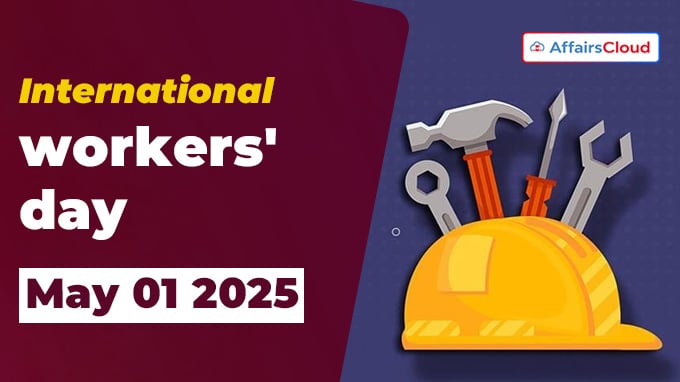 International Workers’ Day, also known as International Labour Day, is observed annually on May 1st to honor the contributions of workers worldwide and to promote workers’ rights.
International Workers’ Day, also known as International Labour Day, is observed annually on May 1st to honor the contributions of workers worldwide and to promote workers’ rights.
- The day serves as a reminder of the historical struggles and achievements of the labor movement. It highlights the ongoing efforts to improve working conditions, advocate for fair wages, and ensure the rights of workers are upheld globally.
- In India, this day is also referred to as May Day, Antar Rashtriya Shramik Divas, or Kamgar Din.
Background:
i.The origins of International Workers’ Day trace back to the 1886 Haymarket Affair in Chicago, United States. On May 4, 1886, a peaceful rally advocating for an eight-hour workday turned violent when a bomb was thrown at the police, leading to multiple casualties.
- This event became a pivotal moment in labor history, symbolizing the struggle for workers’ rights.
ii.In 1889, the Second International, an organization of socialist and labor parties, declared May 1st as International Workers’ Day to commemorate the Haymarket Affair and to promote labor rights globally.
Observance in India:
i.In India, International Workers’ Day was first celebrated on May 1, 1923, in Madras (now Chennai, Tamil Nadu, TN).
ii.The event was organized by the Labour Kisan Party of Hindustan, led by Comrade Malayapuram Singaravelu Chettiar. Two significant meetings were held to honor the occasion, marking the beginning of the labor movement in India
Eight-Hour Day Movement:
i.The eight-hour day movement is a social movement aimed at regulating the length of the working day to prevent the abuse of labor time.
ii.The International Labour Organization (ILO), headquartered in Geneva, Switzerland, convened in Washington, D.C., USA, over a century ago, placing the eight-hour workday at the forefront of its agenda.
iii. This led to the adoption of the Hours of Work (Industry) Convention in 1919, establishing the standard for working hours globally.
Labour laws in India:
To streamline and simplify the complex web of existing labour laws, the Government of India has amalgamated 29 central labour laws into four comprehensive codes.
1.Code on Wages, 2019: To regulate wage and bonus payments in all employment sectors.
2.Industrial Relations Code, 2020: To consolidate laws relating to trade unions, conditions of employment, and industrial disputes.
3.Code on Social Security, 2020: To extend social security benefits to all employees and workers, including those in the unorganized sector.
4.Occupational Safety, Health and Working Conditions Code, 2020: To regulate the health and safety conditions of workers in various establishments.
2025 Events:
DoSJE-UNDP Agreement signed LoA to to Empower Wastepickers:
On the occasion of Labour Day 2025, the Department of Social Justice and Empowerment (DoSJE), the Ministry of Social Justice and Empowerment (MoSJE), Government of India(GoI), entered into a Letter of Agreement (LoA) with , New York, the United States of America(USA) based United Nations Development Programme (UNDP) to improve access to finance, relevant technologies, and ensure a safe and sustainable work environment for waste pickers across India.
- The LoA was formally exchanged between Dr. Angela Lusigi, Resident Representative of UNDP in India, and Amit Yadav, Secretary, DoSJE in the presence of Smt. Yogita Swaroop, Senior Economic Advisor at DoSJE, and P.K. Singh, Managing Director of the National Safai Karamcharis Finance and Development Corporation (NSKFDC).
i.Under this agreement, the UNDP has committed to providing crucial financial assistance for the establishment of State Project Management Units (PMUs) across various states under the National Action for Mechanised Sanitation Ecosystem (NAMASTE) scheme.
ii.These PMUs are designed to streamline coordination between central authorities and state governments, ensuring more effective and timely implementation of the scheme’s objectives.
About National Action for Mechanised Sanitation Ecosystem (NAMASTE):
The NAMASTE is a Central Sector Scheme launched in August 2022. It is a collaborative initiative by the Ministry of Social Justice and Empowerment (MoSJE) and the Ministry of Housing and Urban Affairs (MoHUA).
- The scheme aims to eliminate hazardous manual cleaning of sewers and septic tanks, ensuring the safety and dignity of sanitation workers in urban India.
Odisha CM Mohan Majhi launches ‘Odisha Shramik Sathi’ app:
On May 1, 2025, Odisha Chief Minister(CM) Mohan Charan Majhi launched the ‘Odisha Shramik Sathi’ mobile application(app) during a state-level Labour Day celebration in Bhubaneswar, Odisha.
- This app empowers construction workers in Odisha to access essential welfare services from the comfort of their homes.
- He also announced a Rs.100 hike in the average daily minimum wage, enhancing the livelihood security of labourers.
About International Labour Organization(ILO):
Director-General(DG) – Gilbert F. Houngbo
Headquarters – Geneva, Switzerland
Established – 1919




